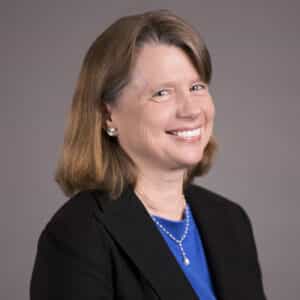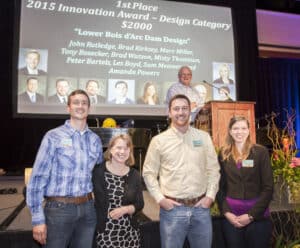Leaders and Legacies: Barbara Nickerson
When Barbara Nickerson started at Freese and Nichols after completing her master’s in environmental science at Texas Christian University, environmental staff at the firm had mainly provided support services for other engineering groups. The work was especially by federal regulations enacted in the 1960s and 1970s that were becoming increasingly integral to our projects.

By the mid-1980s, Freese and Nichols carved Environmental Science into its own technical group. Barb soon became its firm’s first female group manager, and she played a major role in shaping the identities of our group and company.
Now, we continue to provide essential environmental permitting work and assist other groups across the company, and we identify and pursue our own projects, including environmental impact assessments, coastal habitat protection and restoration, and environmental remediation.
Serendipitously, I had the opportunity to interview with Barb and her team when I was graduating from my master’s program in 2002. My dad reconnected Barb and me after running into her husband, Bob, at a conference. My dad and Bob had previously worked together in the 1990s.
While my knowing Barb since the fifth grade may have gotten me the position with Freese and Nichols, from Day One she challenged me to live up to the expectations that we both had for my career. She pushed me and helped me identify opportunities to advance my career, such as providing on-site staff augmentation and program management for some of our major clients. Her encouragement fostered the development of strong leadership skills in addition to my technical skills.
As a group manager, Barb wholeheartedly supported her team members. If she felt stressed by the demands of being a manager — things like workload issues, corporate expectations and progress reviews — she didn’t show it. Instead, she handled her role and responsibilities in a way that let us focus on our projects and clients.
Being the only female technical group leader for a time occasionally brought out a tough demeanor in her, but that’s not the persona we usually saw in our group. She enjoyed work and encouraged us to find ways, like our group’s distinctive motivational posters, to add light-heartedness to our intensity.
While she expected you to set high expectations for yourself, she didn’t dictate them. She helped you realize and stretch to your capabilities. I balked for years at selecting sales as a career path on my Individual Development Plan, but Barb helped me see that many things I already was doing fell into sales and marketing even if I didn’t view them that way. Now, those capabilities are integral to my role.
In the Freese and Nichols tradition of community involvement, Barb took on various philanthropic roles — then bequeathed them to me when she retired to her beloved Cape Cod in 2017 after 37 years with the company. I enjoyed the opportunity to follow her as an industry representative on the Fort Worth Chamber of Commerce Environment & Safety Committee. She also introduced me to KWC Performing Arts, a nonprofit organization that teaches entrepreneurial leadership and other skills through musical theater and arts, where I still serve on the Board of Directors.

She was generous in supporting others, too, like advising the Environmental Science staff to find mentors outside the group to get a broader view of the industry. And she mentored young women across the various technical groups.
She knew how to keep things in perspective. When one of my assignments required the whole project team to carry a new Blackberry device to be available 24/7 (showing my age here), I felt compelled to answer emails immediately. But Barb, who still carried a flip phone well into the 2010s, would tease me and say slow down, spend more time thinking before responding. What seemed like her old-school ways taught me to process more and take things in stride, both essential skills for a young professional and a lesson that may be even more important in 2024.
Today, we have grown Environmental Science into three technical groups, with 65+ environmental scientists and engineers. I am one of the three environmental group managers who continue the legacy that Barb helped create for Environmental Science at Freese and Nichols. I often smile when her advice from 15 years ago echoes from my office as I mentor and coach young environmental scientists and future company leaders on the same principles: Take care of the client, be responsive but purposeful, learn from your mistakes, and grow your network outside of our group.
More than 40 years later, we continue to provide essential environmental permitting work and assist other groups across the company at the same time that we identify and pursue our own clients and projects, including stormwater programming, water quality permitting, environmental impact statement development, coastal habitat protection and restoration, and environmental remediation. Those of us who knew Barb well know that we will continue to do so — in stealth mode.
Barb once said she’d like her legacy to be that “she and her team were successful in making Environmental Science an important and contributing part of FNI.”
She achieved that goal, and we’re much better for it.
A version of this article was originally published March 14, 2019.


